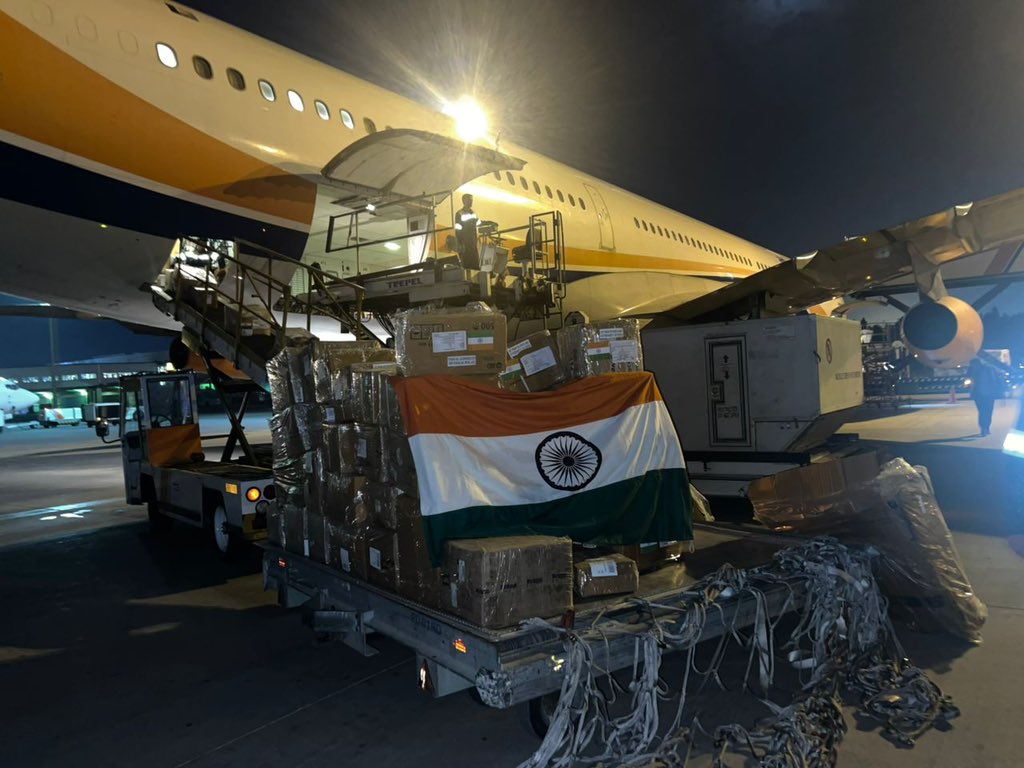India’s Humanitarian Assistance and Disaster Relief (HADR) & Soft Diplomacy

- 09 Sep 2025
Introduction
Humanitarian Assistance and Disaster Relief (HADR) has emerged as a cornerstone of India’s foreign policy and regional engagement. Rooted in the ethos of “VasudhaivaKutumbakam” (the world is one family), India has actively extended aid during natural disasters, reflecting both compassion and strategic foresight. The recent dispatch of 21 tonnes of relief material to Afghanistan after the devastating 6.0-magnitude earthquake, which killed over 1,400 people, underlines India’s commitment to humanitarian outreach and its role as a responsible global actor.
Understanding HADR and Soft Diplomacy
- HADR refers to India’s coordinated relief and rescue operations in disaster-hit regions, at home and abroad. It includes the supply of food, medicines, shelter, sanitation, and technical support.
- Soft Diplomacy implies the use of non-coercive instruments—humanitarian aid, cultural goodwill, and capacity-building initiatives—to enhance India’s global influence and strengthen bilateral trust.
Together, HADR and soft diplomacy enable India to project power through empathy rather than force.
Key Features of India’s HADR Approach
- Rapid Response: The Indian Air Force and Navy ensure swift deployment of relief materials and evacuation missions. For instance, the IAF’s strategic airlift capabilities enable timely supply drops in inaccessible regions.
- Inclusive Relief: Aid packages typically include medicines, food, water, tents, blankets, and water purifiers, focusing on essential survival needs.
- Neutral Assistance: India provides aid without attaching political preconditions, strengthening credibility and neutrality.
- Global Footprint: Beyond neighbours, India has extended assistance to Africa, Pacific Island states, and West Asia, thereby widening its humanitarian outreach.
- Institutional Mechanisms: Agencies like NDMA, NDRF, IAF, Indian Navy, and the Ministry of External Affairs ensure coordination for effective large-scale responses.
Strategic Importance of HADR
- Regional Goodwill: India has earned the reputation of being the “first responder” in South Asia and the Indian Ocean Region. Operations during the Nepal earthquake (2015), Sri Lanka floods, and Maldives water crisis (2014) highlight this proactive role.
- Trust-Building: Humanitarian gestures strengthen bilateral ties, particularly with vulnerable neighbours such as Afghanistan, Nepal, Sri Lanka, and the Maldives.
- Soft Power Projection: Such assistance reinforces India’s image as a responsible rising power committed to collective security and humanitarian values.
- Security Dimension: Active engagement through HADR enhances maritime security partnerships and counters external influences in the region, particularly China’s growing footprint in the Indian Ocean.
Contemporary Relevance
In a world marked by climate change, extreme weather events, and fragile states, the frequency of humanitarian crises is increasing. India’s HADR capacity demonstrates both moral leadership and strategic autonomy. For example, during the COVID-19 pandemic, India’s “Vaccine Maitri” initiative delivered vaccines to over 90 countries, merging humanitarianism with diplomacy.
Furthermore, India’s active participation in multilateral frameworks like BIMSTEC, IORA, and QUAD’s disaster response initiatives showcases its evolving role in shaping global disaster governance.
Challenges
- Logistical hurdles in conflict zones like Afghanistan.
- Resource constraints given India’s vast domestic vulnerabilities.
- The need for greater coordination between civilian and defence agencies.
Conclusion
India’s HADR efforts, anchored in soft diplomacy, reflect a balance of humanitarian compassion and strategic pragmatism. By acting as a credible first responder, India not only saves lives but also nurtures trust, stability, and regional cooperation. In the long run, strengthening institutional mechanisms, enhancing maritime capacity, and integrating climate resilience will further consolidate India’s role as a humanitarian power in a volatile world.
